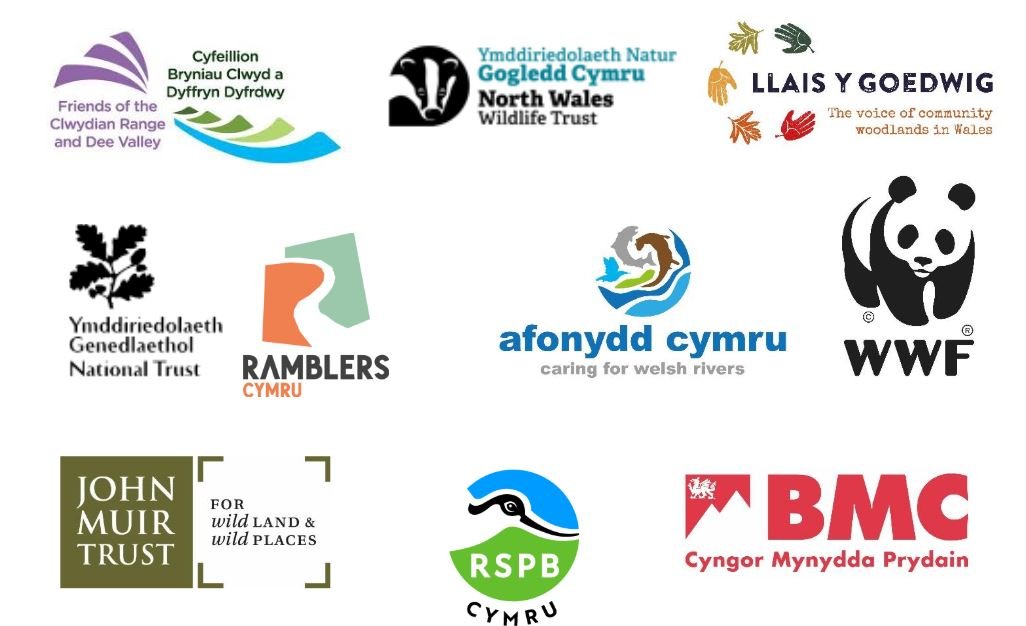Campaign for National Parks - The proposal for a new National Park in North East Wales
Joint Statement on proposals for a new National Park in North East Wales
The creation of a new National Park in North East Wales provides an important and timely opportunity to build on all that is best about the existing Designated Landscapes in Wales and maximise the benefits of designation.
Campaign for National Parks and the Alliance for Welsh Designated Landscapes, along with the range of listed supporters below, believe that this new National Park, the first to be designated in Wales for over 60 years, should be an exemplar for nature, climate and people.
The Valued and Resilient report, in combination with the Biodiversity Deep Dive recommendations and subsequent action plan for Designated Landscapes, has clearly set out a direction of travel to “unlock the potential” of our National Parks. We now need to move further in taking forward the recommendations of the Marsden Report, and the Welsh Government’s proposals to place an enhanced biodiversity duty on public bodies, including National Park Authorities, to contribute to the delivery of statutory nature recovery targets provide a further driver.
This new National Park can build on the existing model of National Parks, whilst recognising the challenges of today and the opportunities to do some things differently that set the standard for future designations.
Delivering this ambition will only be possible if the right supporting framework is in place which we believe should include:
Ecologically coherent boundaries which consider the full network of interdependent ecosystem services and habitats present within the landscape. For example, avoiding dividing protected sites, nature reserves and wide expanses of important habitat (rivers, peatland for example) to ensure that a unified management approach can be maintained.
Increased funding: A commitment to new and ongoing funding at a level which will enable the new National Park to achieve its full potential whilst ensuring that there are no detrimental impacts on the existing Designated Landscapes in Wales. This should include a commitment to long-term and sustained funding for (i) programmes to support habitat and species recovery such as peatland restoration; the creation, regeneration and sustainable management of woodlands and hedgerows; and the ‘renaturalisation’ of water courses. And (ii) services which support visitor engagement and access, including rangers and improved public transport.
Modernised governance arrangements which ensure that those involved in making decisions about the new National Park are representative of both the local population and the wider population of Wales and have the necessary skills. Measures such as fixed terms, maximum lengths of service, compulsory training, role descriptions and appraisal for all members should be introduced to ensure all members take full account of the specific responsibilities of their NPA role when making decisions.
A single planning authority: A dedicated National Park Authority (NPA) with responsibility for both plan-making and planning decisions across the whole of the newly designated area. This is critical in ensuring the functional coherence of the new National Park in delivering social, economic, and environmental outcomes. Decision-making which delivers on the Management Plan must be strategically driven and consistent across the whole area.
The right supporting framework: Both the Local Development Plan and the Management Plan should provide a strong supporting framework for nature recovery, the protection of natural beauty and increased recreational opportunities. This should include identifying areas of the Park where the emphasis is on creating space for wildlife, and other areas where there will be strong support for sustainable transport and other measures aimed at making it easier for people to visit.
Proper scrutiny: As part of updated management plan guidance, Natural Resources Wales should implement an effective system of monitoring National Park Management Plan delivery which ensures that action is taken where a lack of progress is identified.
Full implementation of the Biodiversity Deep Dive recommendations for Designated Landscapes: Including evidence and mapping tools to baseline nature recovery, and consideration in the next Senedd term of updated statutory purposes. Amended purposes should provide a clear remit to promote nature recovery and increase the opportunities for all parts of society to visit, and enjoy, the newly designated area.
New duties and powers: Including new duties for all relevant bodies to deliver updated purposes and to contribute to the development and implementation of a strong and effective Management Plan. Also, this should include the implementation of unfilled commitments to introduce legislation committing National Park Authorities to pursue the sustainable management of natural resources in the exercise of their functions.
Maintaining economic and social resilience for local communities. The new National Park will be an area where people live and work. Our recommendations on new and reinvigorated purposes for the designated area need to be seen in this context, and the small towns, villages and communities within it must be supported to retain resilience and sustainability.
Targeted agri-environment and land management support which utilise the experience of National Park Authorities and maximise the opportunities for nature recovery and improvements to landscape character, increasing local skills in specialist habitat land management and traditional rural skills such as walling and hedgerow laying, and ending damaging land management practices such as burning on peatland.
An emphasis on species recovery: A programme of support which focuses on reintroducing lost species and reversing the decline of vulnerable ones. This should include work to develop community support for reintroductions through understanding and addressing the concerns of local people and promoting the benefits of this type of change.
A renewed focus on mental and physical well-being through social prescribing and initiatives which enable disadvantaged or diverse communities much greater access to the landscape (such as a night under the stars or outdoor learning experience). This should include more support for public transport to allow people to visit more easily.
Enhanced opportunities to understand and enjoy the special qualities of the area with new and improved rights of way that are accessible to all as well as better promotion and protection of access land and cultural heritage.
Whilst we recognise that some of the above will require legislative changes in the longer term, every effort should be made within the existing National Parks framework to achieve as much progress as possible without delaying this designation.
This position statement has been prepared by Campaign for National Parks and the Alliance for Welsh Designated Landscapes and supported by the listed organisations below. We look forward to seeing the designation being taken forward, and we will seek to engage constructively wherever possible within the process.

